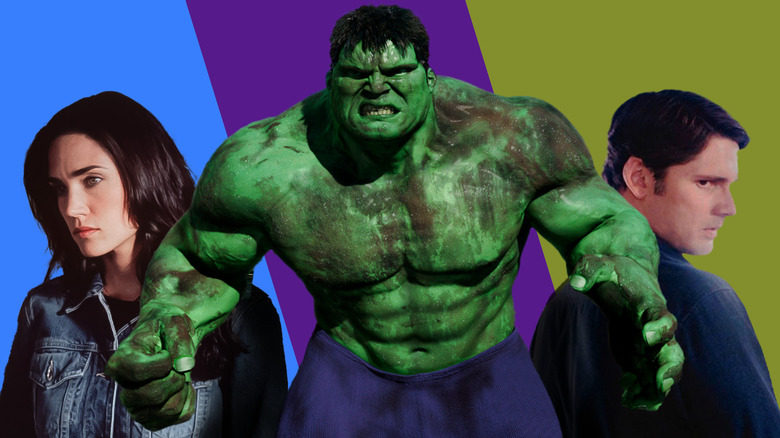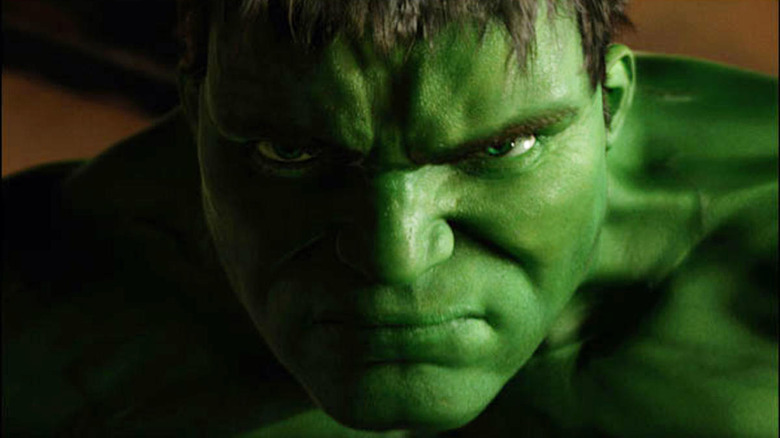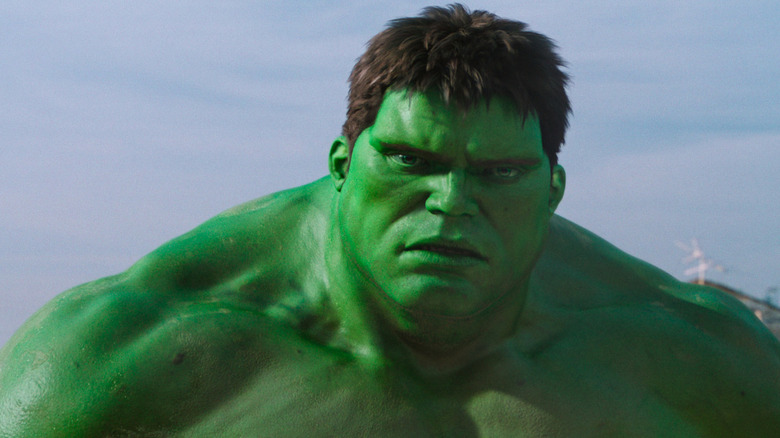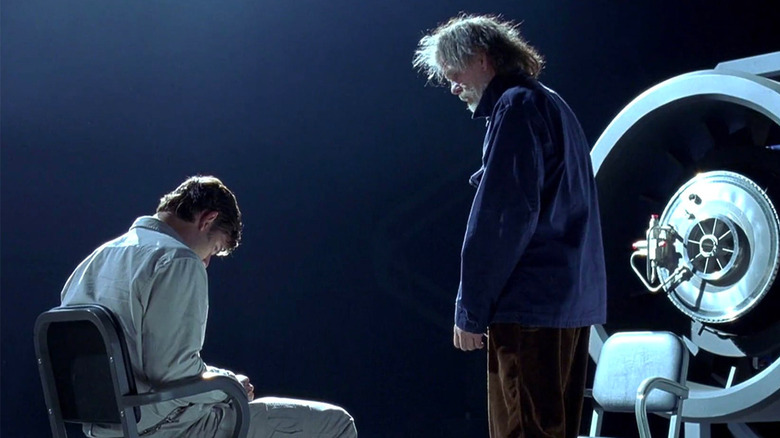Ang Lee's Hulk Is Way Better Than You Remember
These days, Ang Lee's "Hulk" is largely a footnote in the annals of superhero movies. With a barely fresh Tomatometer score of 62 percent and a less than exemplary 29 percent audience score on Rotten Tomatoes, the movie isn't about to make appearances on lists of best superhero movies of all time any time soon. In fact, it's firmly in the lower rungs of Top Ten on our ranking of movies that feature Hulk, losing firmly to Marvel Cinematic Universe team-up properties that give the character mere minutes of screen time.
But is Lee's 2003 film as bad as the (admittedly stacked pile of) evidence makes it seem? No. No, it's not. While it's true that "Hulk" isn't likely to retroactively win any cinematic accolades, the movie has plenty of elements that work much, much better than your average cookie cutter superhero movie. In fact, many ways, the movie was merely ahead of its time. Let's take a look at why "Hulk" should have a much better reputation than it does.
Lee's Hulk dared to be different, but perhaps too early
Even if you absolutely hate "Hulk," you at least have to admit that Ang Lee wasn't afraid to go nuts with it. The movie takes significant liberties with a whole bunch of things, while still keeping the core aspects and characters intact. It devotes far more time to the circumstances in and around Bruce Banner's life than it does to Hulk, exploring how the people around him would freak out if a mega-powerful green giant suddenly burst into existence. In other words, it's not afraid to peek around the hidden corners of the "Hulk Smash" story at the expense of smashing itself, in a way that's usually reserved to a philosophical reimagining á la "Logan." Does the movie Lee himself has called a psychodrama (via The Guardian) work? Not always. Is its approach bold? Incessantly.
The thing is, if you'd insert something like Lee's "Hulk" in the superhero moviesphere right now, people would probably react much more warmly. After two decades and a gazillion live action superhero properties, we now live in an age where the MCU and other superhero movies and shows have already treaded the formulaic path so long that it's time to get a little bit weirder. Sure, there's probably always going to be a subset of Hulk fans who revolt if the big green man does anything that's not smashing-related. However, Lee's thoughtful take on Hulk is more than novel enough that it might very well thrive in today's post-"WandaVision" climate.
Lee dared to tackle the psychological aspect of the character
Hulk has always been an extremely psychological character, and his general smashing tends to be a symptom of his inner turmoil instead of his primary motive. Bruce Banner is understandably a bit of a psychological mess. Hulk didn't ask to be here, but now that he is, he just wants to be at peace, and doesn't understand why all the tanks keep shooting at him.
In "Hulk," Ang Lee takes on these themes – along with the "man or monster" ones that are also integral to the character – and tackles them in a movie that's shaped like a Greek tragedy. That's no exaggeration, either. In an interview with Entertainment Weekly, Nick Nolte specifically said as much.
"When [Lee] came to my house to talk about it, he said, 'I don't know how to make a comic book. I know how to make a Greek tragedy,'" Nolte said. "Right away, my ears perked up."
In hindsight, Lee may have overloaded "Hulk" with dialogue and bombastic speeches. Still, it's pretty hard to blame him for wanting to swing for the fences – especially since Marvel was also hedging its bets with a rather more conventional little thing called "Iron Man" at the time.
The villain game is surprisingly on point (with one notable exception)
"Hulk" makes one big mistake with its villains. Yeah, it's the dogs. Sure, David Banner (Nick Nolte) siccing a bunch of science experiment hounds on Jennifer Connelly's Betty Ross sort of makes sense in the context, but come on -– if you're really going to make Hulk's fight his first big live-action battle against dogs, at least don't make one of them a perma-yapping poodle.
However, if you look beyond this unfortunate decision, the movie's antagonist game's ... pretty amazing, actually. Bruce Banner's father has been an instrumental and dangerous villain for many interpretations of the character, including the "Immortal Hulk" comic book series. "Hulk's" version of David Banner introduces a superpowered twist to the tale, because at the end of the day, "bad dad" is an inadequate villain power set against one of the most powerful Marvel heroes out there. Even so, the core of the concept prevails. Instead of giving Hulk just some big ol' green guy to punch — like "The Incredible Hulk" later did with Tim Roth's Abomination — "Hulk" centers itself around the actions of the domineering, unstable David, who ultimately turns into something not unlike the Absorbing Man.
What's more, the antagonist actors excel. Nolte is great in his role, self-admittedly approaching it like King Lear (per Entertainment Weekly). Likewise, Hulk-hating military man Thaddeus "Thunderbolt" Ross has benefitted from excellent actors across the board, and Sam Elliott sets the bar here with an appropriately stone-faced, charismatic performance. "Yellowstone" star Josh Lucas is also great as the smarmy Glenn Talbot. Together, the trio cover all aspects of Bruce Banner's and Hulk's lives, cleverly making him threatened from every angle. If only it wasn't for those three gamma-irradiated pups, the movie's antagonist list would fare pretty well against most proper MCU films.



